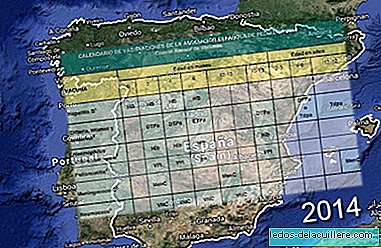
In January, as every year, the Spanish Association of Pediatrics publishes the agreed vaccine schedule for the current year with the intention and desire that all the autonomous communities accept it and the difference ends (absurd) of criteria among them, which makes 19 different calendars.
As already published the vaccine schedule for 2014, updated with the latest recommendations, we will now explain what are the main news and differences from last year.

- The recommendation to administer the first dose of the triple viral vaccine (TV)of measles, rubella and mumps at 12 months old. Similarly, the administration of chickenpox vaccine at this age is recommended (you already know that the Spanish Association of Pediatrics is against its withdrawal and insists that it is advisable to put it at twelve months).
- The second dose of TV and Chickenpox vaccines are recommended between 2 and 3 years, preferably 2 years, in order to achieve a good vaccination before (until not long ago the second dose was administered at 4 years) and avoid measles outbreaks, especially.
- The vaccination schedule against meningococcus C, which until now was administered at 2, 6 and 15 months, is established by administering the first dose at 2 months, the second at 12 months and the third at 12 years of age, since it has been seen that children vaccinated in adolescence have protection for longer than those vaccinated as children.
- Administer at 11-12 years the fifth dose of the combined tetanus and diphtheria vaccine (which was previously administered at 13-14), but using the vaccine that also carries pertussis. In recent years several outbreaks of pertussis have been documented in our country and, given this situation, the need to vaccinate pertussis has been established, not only at 2, 4, 6, 18 months and 4 to 6 years, but also at 11-12 years. The reason is that the immunity of whooping cough with vaccines has a limited duration.
- The Meningococcal B vaccine to control epidemic outbreaks (it is the cause of 71.4% of cases of meningitis) and for this it urges the Ministry to allow the free commercialization of the vaccine in pharmacies (at the moment the vaccine exists, but its commercialization is not allowed) .
The rest is the same as what was suggested last year and, honestly, I have serious doubts that the different communities will agree, because of the recommendation to administer the second dose of TV at 2-3 years, For example, a year ago, and in Catalonia, or at least in my city, it is administered at 4 years.
But the difference is no longer just that. In my city, some Primary Care Centers depend on one Hospital and others depend on another (they are different companies). Well, we, in the center where I work, administer the Tdpa vaccine (that of tetanus from 4 to 6 years) at 5 years, considering that it would be beneficial for the control of pertussis outbreaks, and the centers that depend the other hospital is administered at 6 years.
Similarly, newborns from other autonomous communities arrive at our center with the hepatitis B vaccine administered as soon as they are born, by protocol and without the mother carrying the virus (negative serologies) and here, in that case, the We administer up to 2 months.
That is not that it is incorrect, because in the explanation of the current calendar there are several options, but it is rare that we all do it differently and, worse, mislead, since professionals have to previously study the calendar of children who come from other centers to determine exactly which leads and which not when, if we were all on par, it would be much easier. How many children have ended up carrying a dose of more, or a dose of less, because it does not carry a vaccine that it should take (and it is assumed that it carries it) or because it already carries one that they do not usually carry by age.
The fault lies with the professional, of course, who must ensure that this does not happen. However, there is increasing pressure on care, we are less for the same patients (or more) and the interesting thing in this regard is to try to minimize errors from above, that is, by making things easier for nurses so that they do not have to be doing a particular study of each vaccine card.












